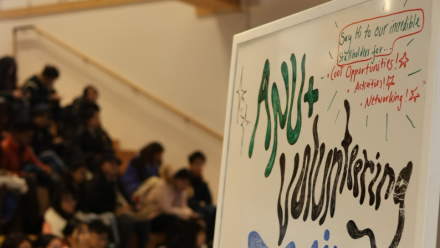Meet Carys Chan
I wanted to look at how, if you have strong self-efficacy beliefs, you are more likely to believe in your own abilities and that actually mediates the negative relationship between work-family conflict and job satisfaction.
Award-winning Singaporean student Carys Chan has recently begun a PhD in management in which she examines what work-life balance means to the Singaporean worker.
Singaporean student Carys (Xi Wen) Chan has packed a lot into her time at ANU since enrolling in a Bachelor of Commerce in 2010.
Having studied finance and accounting in her undergraduate degree, she decided to make a shift and undertake her honours year in management - her interest stimulated by some of the ideas uncovered in her Organisational Behaviour classes.
Now in her fifth year at ANU she is embarking on further research towards a PhD in management.
Outside her academic studies, Carys has always been busy, serving as both a CPA Australia and an ANU Student Ambassador. She was Secretary of the Finance & Banking Society at ANU (FINSOC) and Treasurer of ANU Dance. She completed a number of internships, including with the Australian American Association, KPMG Advisory, Thomson Reuters and VTB Capital. In 2013 Carys was also one of six winners of the Naked CEO Boardroom Competition.
Recently, Carys received the Council of International Students Australia (CISA) International Student of the Year (Undergraduate) Award in recognition of her community involvement, leadership qualities and academic achievements (which include First Class Honours, completed in 2013).
Carys' research, both for her honours thesis and now for her PhD, focuses on questions of work-life balance and job satisfaction. In her honours work, drawing on ideas from the Positive Psychology movement, she was interested in the positive dimensions of the work-family relationship where often the focus has been on questions of conflict and negative influences.
"A lot of the talk is about work-family conflict, but I started thinking about how experiencing work and family roles doesn't only lead to conflict. It can also be synergistic - it can bring benefits," she says.
"I wanted to look at how, if you have strong self-efficacy beliefs, you are more likely to believe in your own abilities and that actually mediates the negative relationship between work-family conflict and job satisfaction."
In Carys' home country, Singapore, work-life balance has become quite a buzz word, with the government and large organisations starting to implement specific work-life balance policies and employing work-life consultants. It was with this in mind that Carys was prompted to continue her research to PhD level:
"The situation in Singapore is that people high up the pay scale are getting a better work-life balance, but some of those low income families actually have a worse work-life balance. It's something I wanted to address because as a whole the country is pretty prosperous but we do have people who are left behind. I'd like to see in my lifetime, work-life balance improving at all levels. That's what really drew me to do research in this area."
Carys will carry out interviews and surveys to gain a perspective on worker beliefs and expectations about work-life balance, and how it is changing in Singapore. She hopes to bring a 'theoretical lens' to bear on the issue and enhance understanding of what work-life balance really means to the individual employee and how organisations can ensure they get it right in the future.
Apply for your PhD at ANU, Australia's World Top 20 University. Scholarships are available. Find out more.


